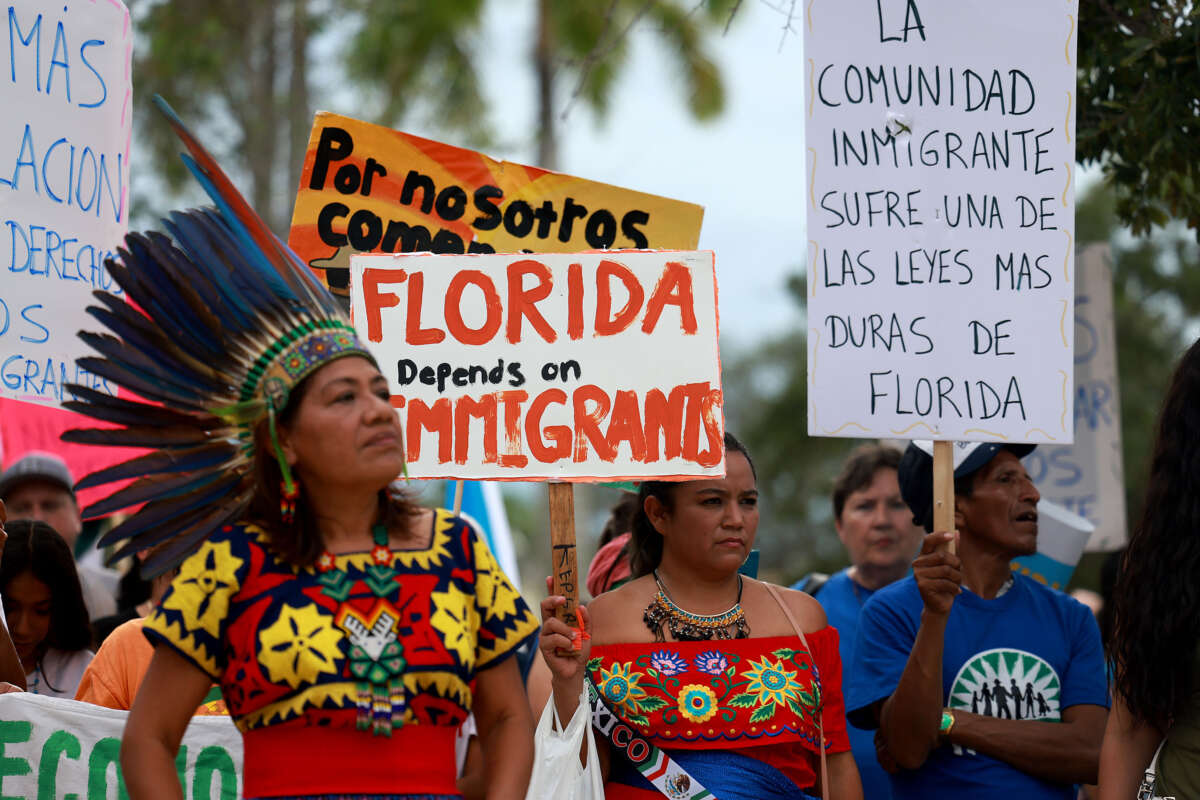Support justice-driven, accurate and transparent news — make a quick donation to Truthout today!
Protests against Florida bill SB 1718 have erupted across the state after the bill went into effect on Saturday. Under the law, Florida no longer recognizes driver’s licenses issued to undocumented immigrants from other states, and criminalizes the transportation of undocumented workers.
Since Gov. Ron DeSantis (R) signed the bill into law in May, Latinx activists have organized labor strikes, boycotts, cross-country caravans and marches to protest Florida’s anti-immigrant policies.
“We are fed up because despite our work, despite how we produce this country’s wealth, and because we pay taxes […] instead of gaining more rights we are losing rights,” Juan Jose Gutierrez, a California activist who is part of a pro-migrant caravan traveling to Florida to protest the law, told BorderReport. “Like my mother would say, ‘we are walking backwards like the crab.’”
Over the past week, there have been protests against the law in Orlando, Tampa, Fort Myers, Lake Worth and Tallahassee. There have also been rallies in solidarity with Florida immigrants across the country, including in Los Angeles and Chicago.
“Yesterday, on the first day that Florida’s anti-immigrant law #SB1718 went into effect, hundreds of immigrant workers marched in the streets of Homestead to say : There is no Florida without us, and we’re here to stay. ¡Aqui estamos y no nos vamos,” WeCount!, an immigrant rights organization, said on Twitter.
Some organizers have taken to social media, posting actions with the hashtag #LaLuchaContinua (‘The Fight Continues’). Others are writing ‘Todos Somos Florida’ (‘We Are All Florida’) on their cars in solidarity with protesters.
Florida is home to 4.5 million immigrants, who make up 21 percent of the state’s population. Of those immigrants, 1.8 million people are non-citizens, which includes immigrants who are lawfully present and undocumented immigrants. SB 1718 affects 772,000 people, or the 8 percent of the state’s population who are undocumented.
Activists have noted that the anti-immigrant law may also affect the family and friends of immigrants who are lawfully present in the state.
“Another thing people are missing about Florida is that the majority of immigrant workers are likely documented and it’s probable they have family members that are not. That, my friends, is enough to get any one of us to want to leave the state too,” Arturo Dominguez, a racial justice advocate and journalist, said on Twitter.
The law is also expected to have a detrimental impact on the state’s economy, specifically the agricultural and construction sectors. The Florida Policy Institute (FPI) estimates that some industries could lose 10 percent of their workforce, which would cost the state $12.6 billion per year.
The American Immigration Council estimates that 2.7 million immigrants currently work in Florida, making up 26 percent of Florida’s labor force in 2018. Of those immigrants, FPI estimates that 150,000 are farm workers and 150,000 are front line workers, many of whom work in health care.
In the wake of SB 1718 being signed into law, many immigrants have fled the state. In a video that went viral in May, a construction site is shown seemingly abandoned by workers in response to the sweeping anti-immigration bill. Other videos have surfaced showing acres of rotting fields, seemingly because agriculture workers have fled the state.
Alexis Tsoukalas, a policy analyst for FPI, wrote in The Gainesville Sun: “There can be no prosperity without immigrant Floridians, including undocumented residents. If there is anything to fear, it is not new arrivals of immigrants, but what would become of Florida without them.”
The bill’s passage has prompted The Florida Immigrant Coalition (FIC) and the League of United Latin American Citizens (LULAC) to issue travel advisories for the state.
“Due to unconstitutional legislation supported by Governor Ron DeSantis and introduced by Legislative leadership, every county in Florida poses a heightened risk of harassment, possible detainment, and potential family separation based on racial profiling,” FIC stated.
Mexico has also condemned the law, vowing to protect undocumented Mexicans in Florida.
“Criminalization is not the way to solve the issue of undocumented immigration. The existence of transnational labor markets, and the intense ties of trade and tourism between Mexico and Florida, cannot be overlooked by measures inspired by xenophobic and white nationalist sentiments,” Mexico’s Foreign Ministry said in a statement.
A coalition of civil rights groups, including the Southern Poverty Law Center, the American Civil Liberties Union (ACLU) of Florida, Americans for Immigrant Justice and the American Immigration Council, intend to sue DeSantis over the law.
“This attack on our immigrant communities will not stand. Purposely designed to inflict cruelty, SB 1718 is unconstitutional and undermines our democracy…We are committed to ensuring that immigrants are treated fairly, equally and with dignity,” Paul R. Chavez, senior supervising attorney for the Southern Poverty Law Center’s Immigrant Justice Project, said in a statement about the lawsuit.
Trump is silencing political dissent. We appeal for your support.
Progressive nonprofits are the latest target caught in Trump’s crosshairs. With the aim of eliminating political opposition, Trump and his sycophants are working to curb government funding, constrain private foundations, and even cut tax-exempt status from organizations he dislikes.
We’re concerned, because Truthout is not immune to such bad-faith attacks.
We can only resist Trump’s attacks by cultivating a strong base of support. The right-wing mediasphere is funded comfortably by billionaire owners and venture capitalist philanthropists. At Truthout, we have you.
Our fundraising campaign is over, but we fell a bit short and still need your help. Please take a meaningful action in the fight against authoritarianism: make a one-time or monthly donation to Truthout. If you have the means, please dig deep.
